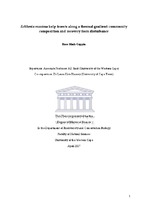| dc.description.abstract | Climate change will influence species distributions, survival and ecosystem functioning, mostly
through changes in sea surface temperatures and storm disturbance. Species are expected to shift
poleward in response to ocean warming, which will increase species interaction strength, and cause
tropicalisation of temperate ecosystems. Furthermore, if storm frequency and magnitude increases,
this could have detrimental effects for species already on their thermal limits. One such group of
coastal species is kelp. Kelp are ecosystem engineers that rely on cool-temperate water for survival,
and which support an array of fauna and flora. Kelp-based ecosystems are also highly productive, and
provide important inorganic input into coastal food webs, largely through detritus. Temperature and
disturbance have been shown to be important drivers of kelp ecosystems globally, and we expect that
local changes in these drivers may affect kelp ecosystem composition and functioning along the
south-western Cape coastline where they form extensive habitats. | |

